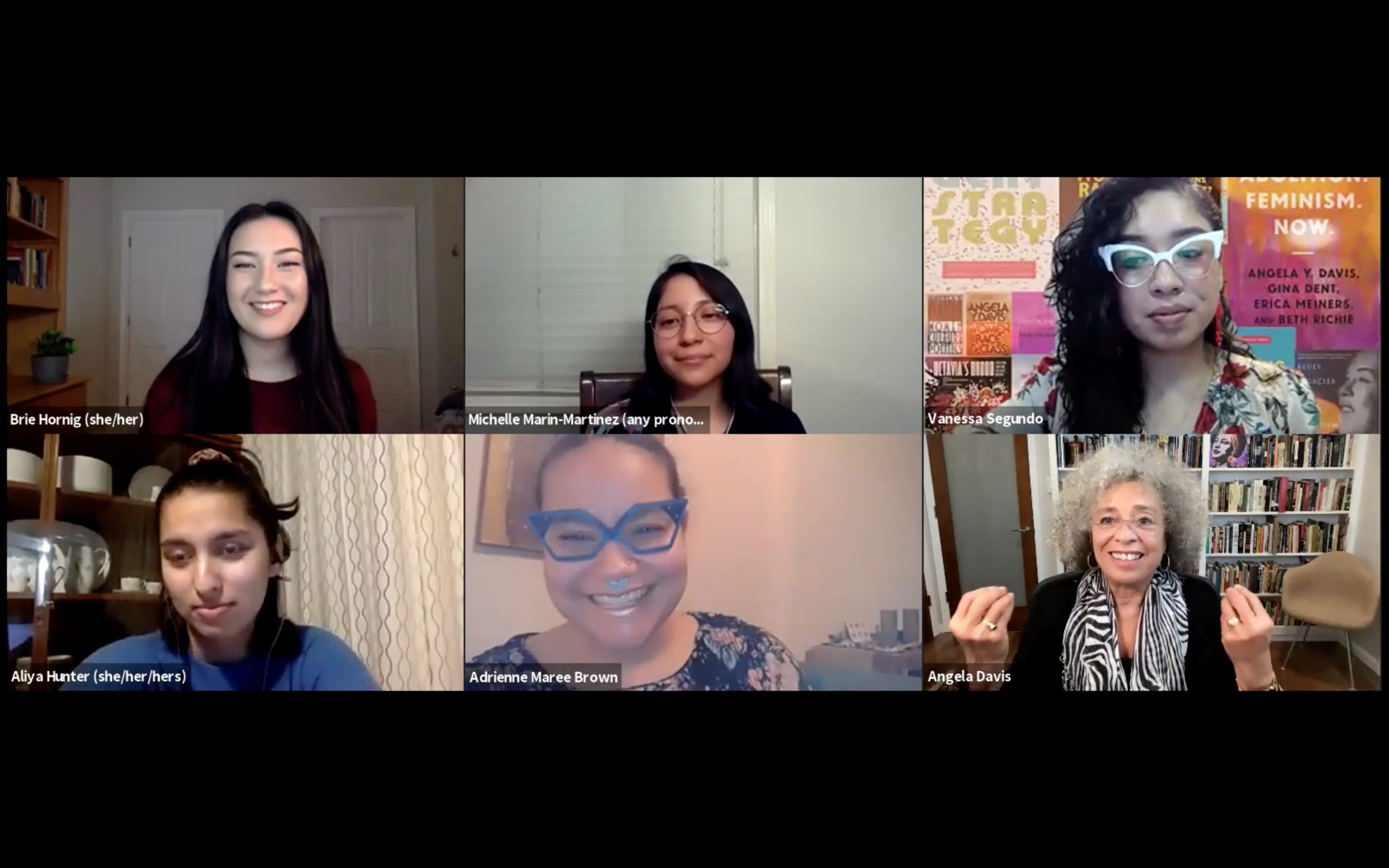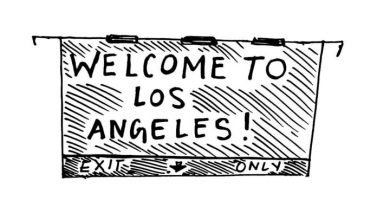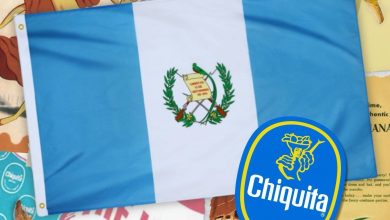‘50 Years of Imagining Radical Feminist Futures’: UC Davis WRRC’s Panel featuring Angela Davis and adrienne maree brown

Image description: Six individuals are displayed on a Zoom screen. Four moderators are shown alongside two speakers, adrienne maree brown and Angela Davis.
The UC Davis Women’s Resources and Research Center held an intergenerational feminism virtual panel on November 17, 2020 in celebration of the center’s 50th anniversary. The program featured leftist activists and authors adrienne maree brown and Dr. Angela Davis. During the panel, Dr. Davis and maree brown examined accessibility of language in activism, personal politics, and abolitionist futures. The two first discussed the role of academia in one’s activism (22:58). While universities are places of movement and revolutionary activity, academia as an institution was built by the oppressor and is therefore unnecessary in the work towards liberation. Working class communities founded people’s movements in response to their lived experiences and the legacies of genocide and slave labor. While academia is impacted by the white construction of history, students can still work to question the institution from within. However, education through institutions is deeply privileged and excludes lower class communities, with limited education opportunities for communities of color.
In order for activism to be effective, activists must use accessible language (43:07), as supported by maree brown. Language should not be a blockade in the collaborating or the sharing of ideas. When discussing people’s movements, one should always pay attention to how they are speaking. Through vocabulary and language, the actor should prioritize the intent to raise community and contribution, rather than to justify superiority and elitism. With the prevalence of abstract ideas and theory in mainstream activism, elitist academia exploits people’s lived experiences and translates their stories into incomprehensible jargon. Furthermore, communities of color are already disadvantaged by the way white academia classifies what counts as education or knowledge. It is integral to implement everyday words in politics to spread the ideas of abolition and liberation to the global population.
With the uneven distribution of resources and socioeconomic opportunities for BIPOC communities, the stolen ideas found in the language of modern activism excludes marginalized groups from academic discourse. Dr. Davis discussed the origin of feminist studies and critical prison studies outside of academia (27:13). Language has been a powerful tool over time, utilized as a way to build relationships. It is necessary to recognize ancestral knowledge, as activism draws from the archive of lived experiences. With the formation of knowledge from labor, working class communities have employed language to communicate about liberation and revolution. However, academia restricts the power of language as a revolutionary tool by making it inaccessible. For instance, universities have and continue to steal language from grassroots organizers, such as “identity politics.” “Identity politics” is a term coined by the Combahee River Collective in 1977; however, universities’ modern use of the complex idea lacks class analysis. With stolen language in academia, people’s movements are co-opted for the neoliberal agenda of academic capitalist institutions. Universities are grounded in colonialism and slave labor, however, campuses also serve as environments where people can come together and participate in subversive activity. Abolitionist work reaches beyond the academy, with the plethora of ideas within the individual and their environment.
When approached correctly, academia is a place for growth and community, as well as a place to develop revolutionary ideas from within the institution. maree brown believes all spaces are sites for revolution (41:36). Academia as an environment has the potential to escape its colonial legacies and oppressive systems. The collaboration and community developed between colleagues and scholars are valuable in the growth of personal knowledge. The discussions and questions about current systems and their flaws are significant in breaking apart and analyzing the binaries created by the white heteronormative ways of thinking. In using academic knowledge for activism, Dr. Davis speaks on the importance of interdisciplinary studies (38:20). The pursuit of knowledge through multiple disciplines recognizes the value of information from different sources. Holistic knowledge is needed to critique how we understand and conceptualize.
The panelists also covered the contemporary discourse of abolition and its presence among the politics of 2020. The dialogue of abolition has appeared in mainstream media with the current wave of anti-racism and anti-capitalism. The speakers support the sentiment of Ruth Wilson Gilmore who stated how abolition is about presence, rather than absence. maree brown drew upon the knowledge of Mariame Kaba, whose work portrays the failure of the current police state over the past two and a half centuries. The dismantling of the police state and prisons is critical to the further development of community work and mutual aid.
maree brown approaches the possibilities of abolition outside of policing and prisons through community and accountability (48:43). While the current conversation of abolition targets the prison-industrial complex and the police, other aspects of capitalism, white supremacy, and imperialism require the deconstruction of learned knowledge. One of these issues revolves around globalization and its impact on nationalism and nation states. The enforcement of national borders and policing of migration are products of the global bourgeoisie. The role of the economy with right-wing powers relies on global capitalism. The same forces that control the international economy consistently affect the U.S. prison industrial complex. Kaba and other abolitionists’ research illustrate the impact of redistribution of wealth and resources on the future.
Dr. Davis shared her abolition work in the 1970s (52:06). At the time, people generally believed that abolition was “unrealistic” and “absurd.” In the 21st century, abolition as a way of living is expanding, with its ideals reaching a larger population. Since mainstream media focuses on ‘Big P’ politics, individuals seek to take more prominent political actions in order to achieve social change. In the subject of abolition, ‘Big P’ politics calls for the need to recreate institutions and dismantle systems of power. While the actions are necessary in the path towards abolition, the intersectional feminist lens of abolition also considers the personal as political: the state functions in everyday lives and personal choices through ‘little p’ politics.
maree brown described how the Western narrative shapes human behavior through all aspects of everyday life: one’s position, beliefs, values, etc. With the emphasis on individualism, American society loses the understanding of a shared interconnectedness (57:54). The presence of competition and hierarchy within the United States drives the narrative that punishment is required and crime is individualized, adding to the heightened divisiveness of the nation’s politics. The police state’s emphasis on these ideas conceal the fact that individuals are victims of the systems themselves, which have continued to perpetrate targeted cyclical violence throughout history. maree brown encouraged people to come together to create something more compelling than hate and self interest (1:00:00).
Dr. Davis then drew upon the ideas of Stuart Hall to portray the cultural significance of learning and unlearning. Dr. Davis emphasized how individuals must actively engage in work against racism, capitalism, misogyny, heteronormativity, and patriarchy. The current events of modern politics are direct consequences of the harmful institutions built by white colonizers. At the same time, activists have to be conscious of how power affects cultural identity. Culture plays a major role in shaping our ideas about politics. Stuart Hall characterized ideology as frameworks which people translate and interpret society, which he saw in the media, social gatherings, and other facets of society. Hall demonstrates how all interests are politically and ideologically constructed. Thus, culture affects how we think and act, our awareness of what’s happening, and the choices we make to act upon our perception of the world.
The global COVID-19 pandemic has had an immense role in shaping politics and activism over the past year. The responses to the virus are products of global capitalism: the commodification of healthcare and the distribution of the vaccine, the inaccessibility of medical resources in the Global South, and the ongoing climate crisis, which exacerbates the problems of the pandemic and disproportionately affects the Global South and working class communities of color. Dr. Davis highlighted the conjunction between the transnational lockdowns and the most recent wave of the Black Lives Matter movement, following the lynchings of George Floyd and Breonna Taylor. The concurring isolation and calls to action allowed people to reflect on the structure of racial capitalism. The histories of oppression and the work that precedes us have led to the events that have unfolded in 2020’s global politics. Indigenous, Latinx, and Black communities have laid the groundwork and continue to lead community and grassroots organizing.
The final thoughts of the panel promoted hope for abolitionist futures (1:13:22). maree brown stressed the collective impact of climate change. The urgency of the climate crisis caused by human activity shifts how we view our divisions and relations to each other and the planet. Dr. Davis emphasized pleasure activism and the power of music and art in transformation, which influences our dreams, perception of the world, and visions of justice and freedom. maree brown’s “Pleasure Activism” reflects the politics of healing and happiness, which reframes activist work as something that can feel good. While the creation of new institutions requires time and physical, intellectual, and spiritual labor, self-care and rest are essential in abolitionist living. She highlights the importance in believing that there is a different world possible, while also recognizing there are never any guarantees. Individuals must implement activism and knowledge for the future of abolition for the coming generations, which is reflected by Dr. Davis’s final remarks:
“I have been teaching since 1969. And so I have seen many generations of students, many generations of undergraduates, many generations of graduate students. And what I want to say is that this generation is the very best. So you make me feel hopeful. And, you know, the best work that all of us can do is to create the terrain for a new generation to take the ideas and the work and move forward. And you all are doing it better than anyone else has thus far. So I just want to express my gratitude. And I smile now, I used to be so upset with stu- What kind of education have they had? They don’t know anything- You know, and now I’m just beaming every time I have a conversation with students now. It leaves me so inspired and it also makes me feel very young again. So thank you.” (1:26:48)
A transcript of the event can be found here.




